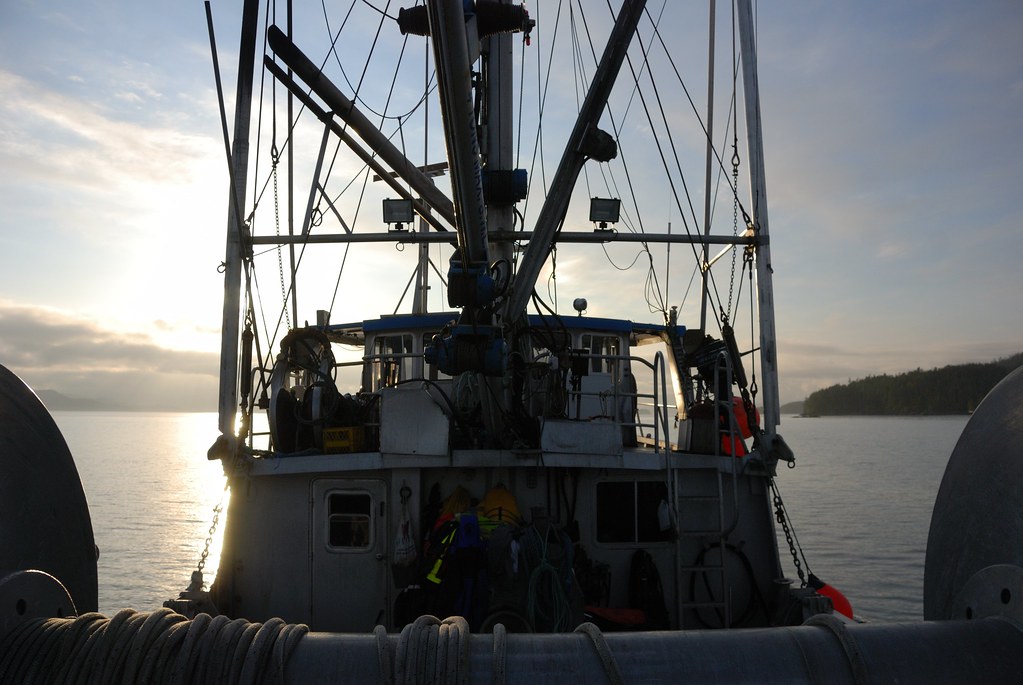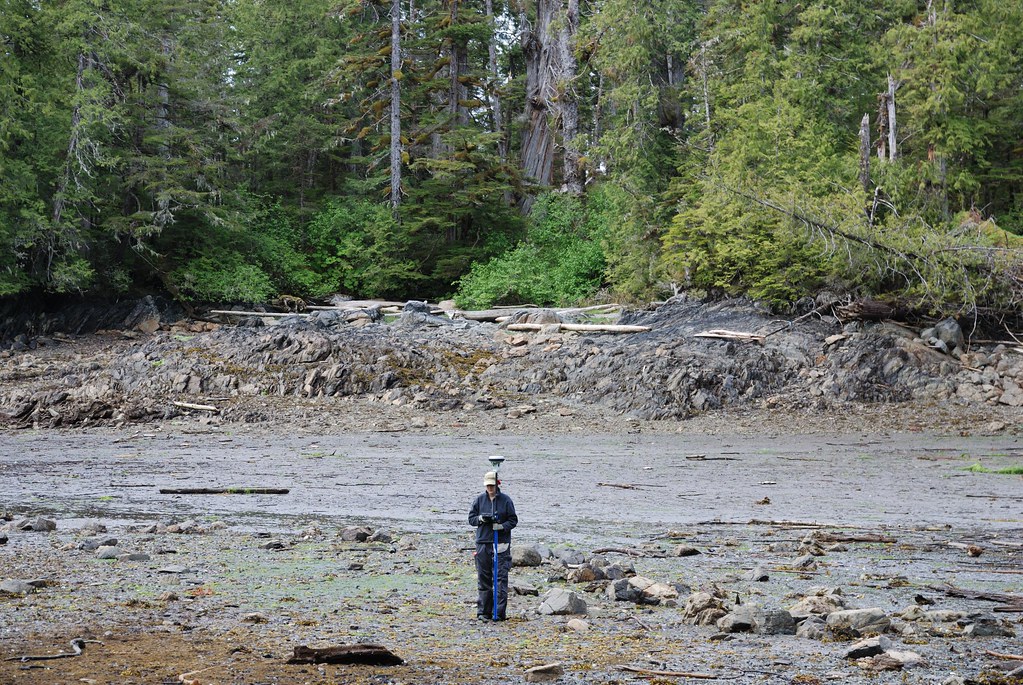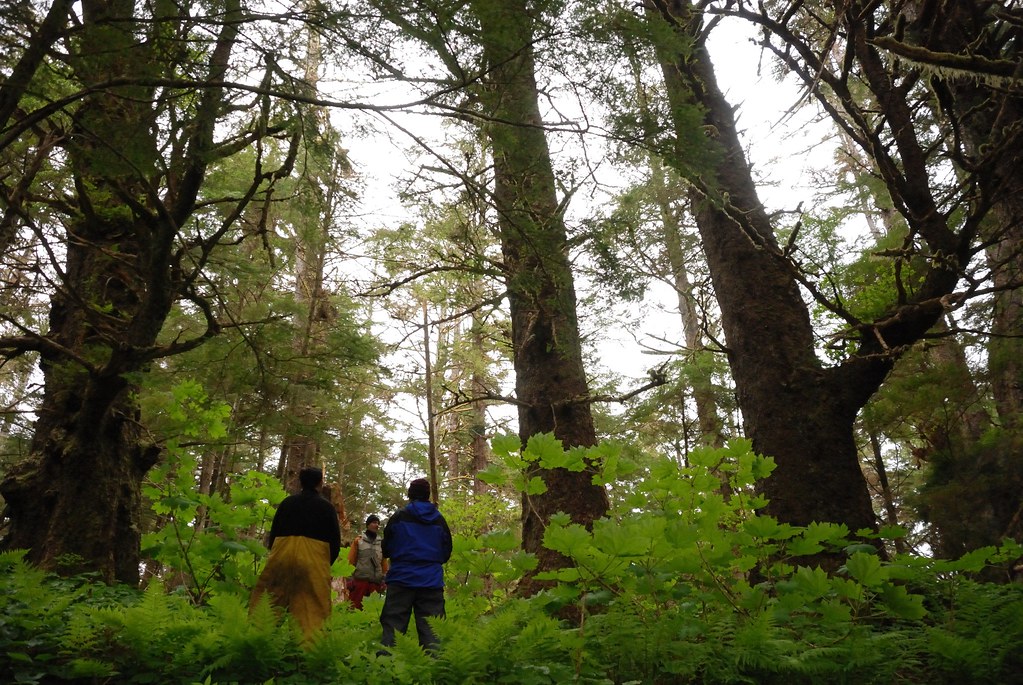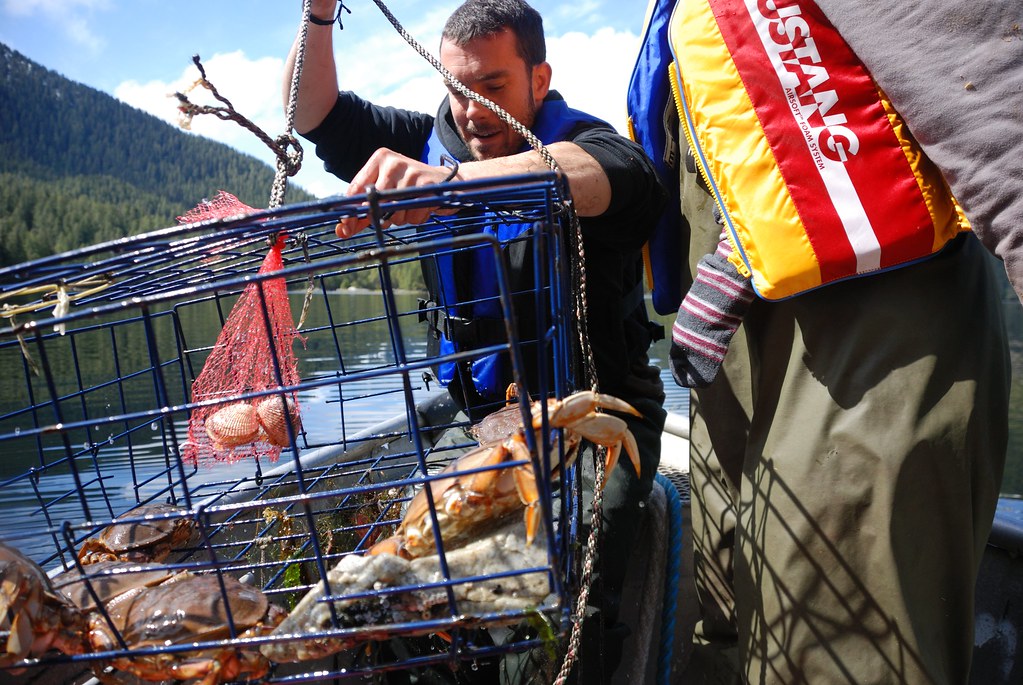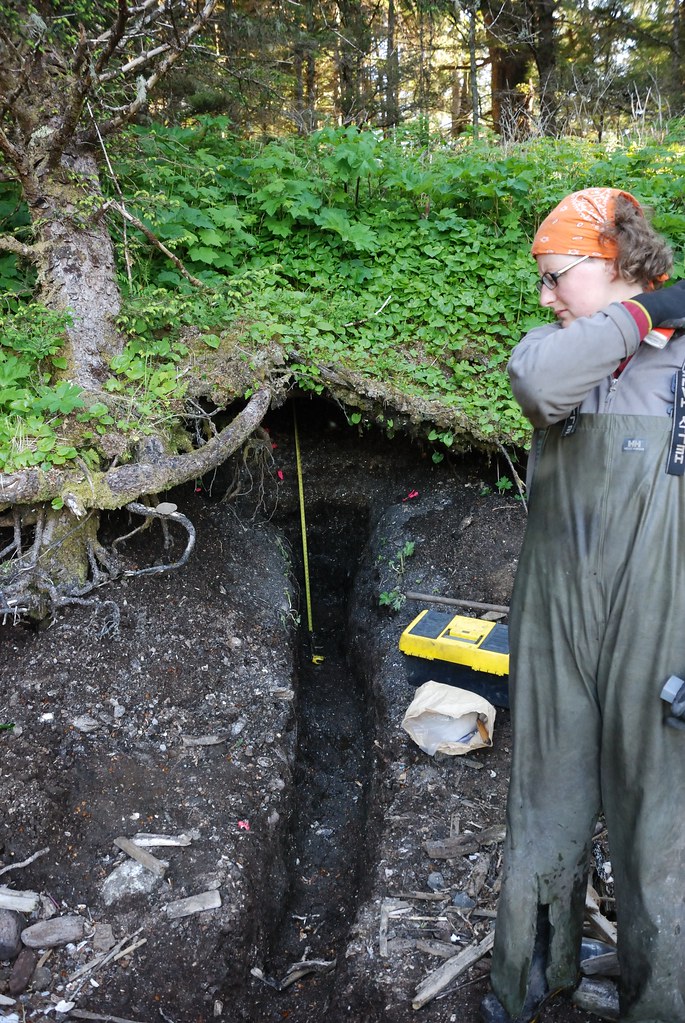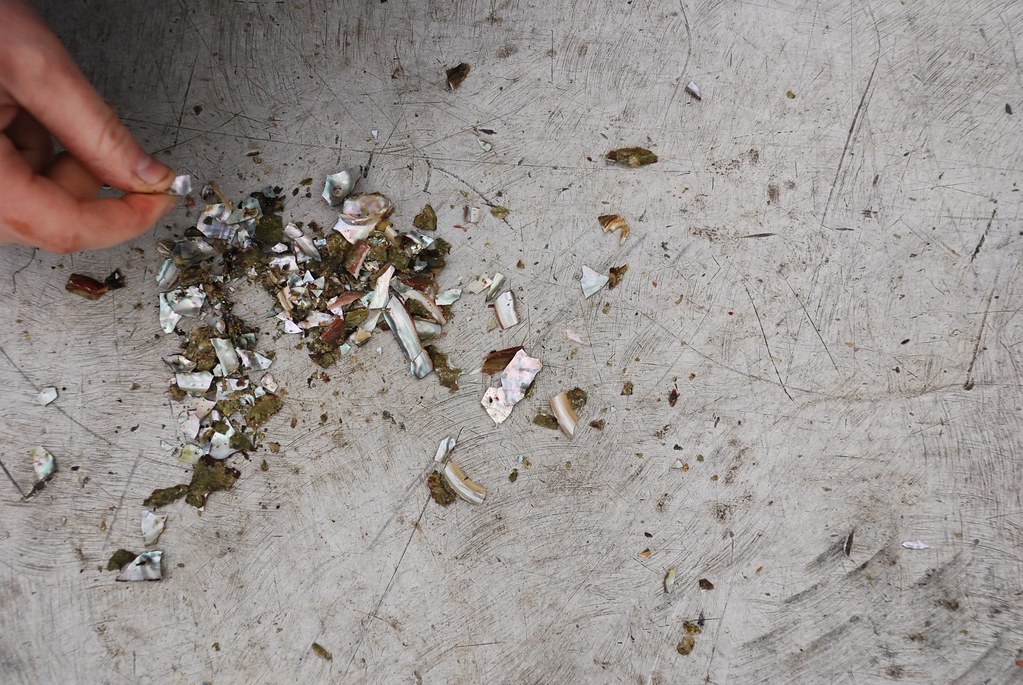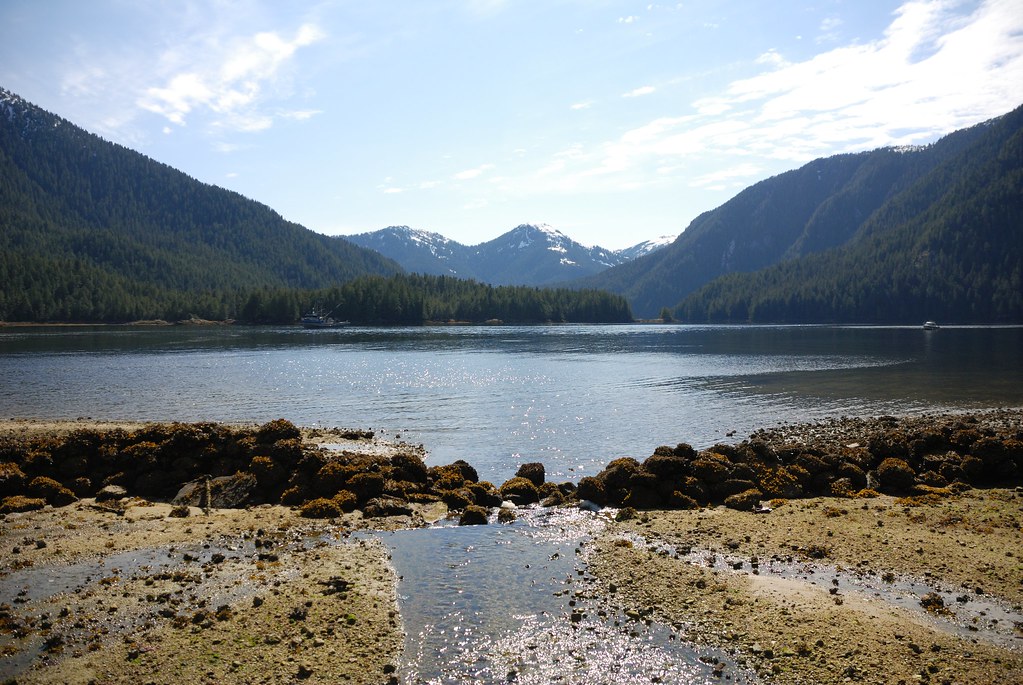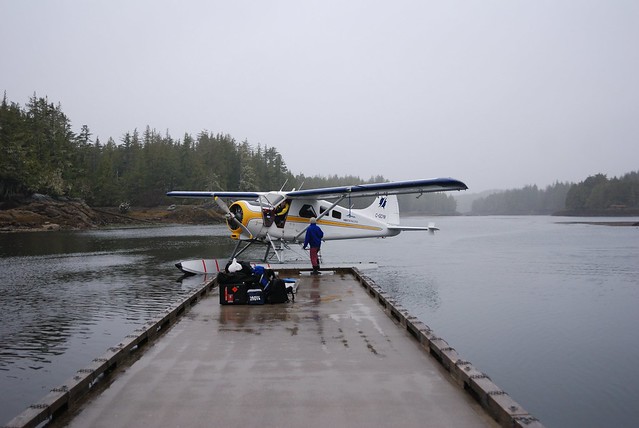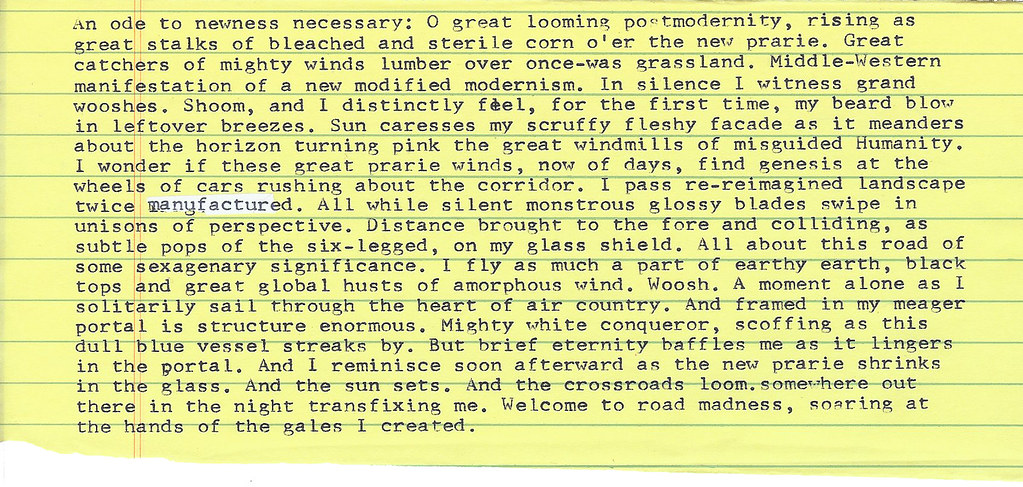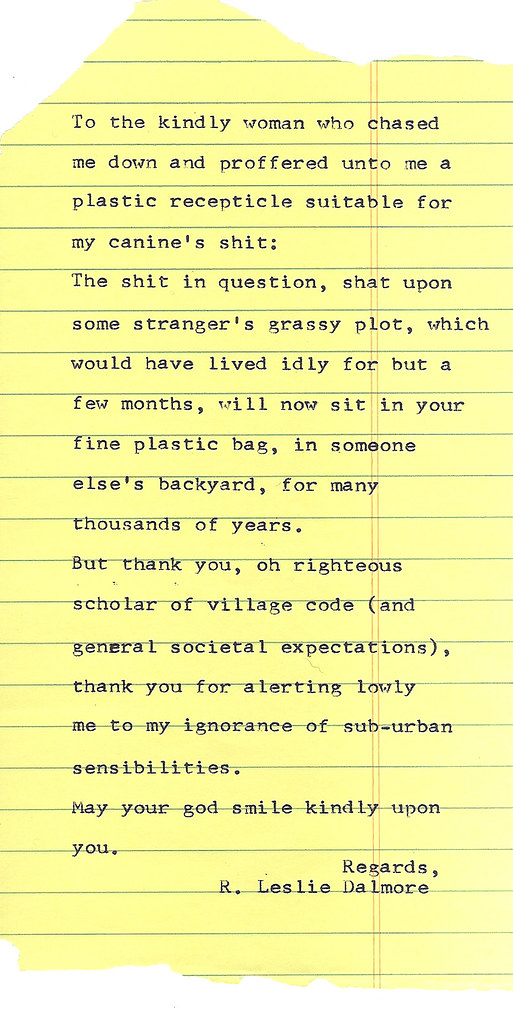11 years ago
25 January 2012
The Artists Liberal
I'm involved in a new project collaborating with some of my fellow Butler graduates. We're writing a news blog. Find fiction and reporting and creative commentary all arising out of the liberal arts tradition. New(s) articulations. See us at http://theliberalartist.org/.
03 December 2011
Ethnographic Perspectives on Laxyuup Gitxaala
The following is a paper I presented at the American Anthropological Association annual meeting in Montreal. November 2011.
---
The question is easy: What are the changes undergone in archaeology under a collaborative setting, and why is it worth it? Experience speaks for itself in the moment, but the following is a representation of the transformation undergone in archaeology as experiences across time and space collide in the field.
---
Part I: Katrena Leslie
Here is Katrena Leslie, our platform upon which we moved and lived across the water in the Gitxaala territory. And the boat floats, it bobs up and down, it rolls and leans. The people on board do as well, some tossed more violently than they expect, others lulled to sleep, and a few lulled to sickness. But Katrena Leslie is not inert, she is not some welded piece of steel propelled by diesel. She takes on as many roles are there are persons on board. She is a table around which planning and meals are shared at once. She is a location, central and mobile, pivotal in her role as mediator between perspectives and goals. And she is our guide, her belly full, like a well-packed backpack, of tools and data, books and food. And with her at our sides we were able to move through the territory, finding and visiting and experiencing disparate sites of knowledge with her as our constant. Katrena Leslie, she helped us see, from top to bottom, accumulated ways of knowing, oral histories beneath the ground, and caked on all our faces, evidence of having been and having done, and having seen.
---
So now we start moving across the territory. We begin as I did in Lach Klan, the village, the central home of the Gitxaala First Nation. And we, all of us involved, have been here, walked upon the anthropogenic deposits upon which the houses of our hosts and friends sit and have sat for many years. The island landscape is the space we navigate, but no matter how far we wander in kilometres and miles, we are never far from the village. Though physically inhabiting distinct geographic space, we are transported, in moments, far from the active practice of archaeology. The flat leaves of devil’s club are reminders, opaque windows through which the beam of the total station travels in space back to the people who call this home. The leaves and bushes and fallen trees were reminders of our purpose, to supplement a way of knowing. In these moments and otheres we carried Gitxaala in our pockets, as the global positioning handhelds might well have been called Gitxaala Position Systems. Anthropology and Gitxaala are old acquaintances, but now become more and more colleagues as their components are at once and always moving and contributing to what makes up the Laxyuup Gtixaala.
---
And we mapped, oh how we mapped. Got it. Yep. Got it. Face the prism toward me. Level? Let’s shoot in the next station. And so on across the sites.
Each laser beam from the total station a vision, each vision a point. The maps are a living, yawning thing, moving point to point across a landscape big or small. I learned on a skiff one evening from my friend Greg, that the people used to navigate their ocean routes moving point to point. Each point a point of reference. And so it is with topography, each point a way of visiting and remembering a place. And each map is a record of visiting, a physical (or digital) memory of a place, and a reference for the future. To map, for us, is to situate ourselves. Like a spider we stretch a web across a landscape, each point drawing us closer and closer to an understanding. Manufacturing an artifcatual world, a base upon which to live our work.
---
Let’s move to the real meat of it now. The practice of archaeology. The object of study, the culture area, the regional specialization. Archaeology takes place upon the map, upon the land, upon the anthropogenic evidence of time immemorial. Each percussion core, each ping an intrusion into the past. Archaeologists are time travelers, which is not to be cliché, but rather literal. Far from fiction, the practicing archaeologist, with each scrape of a trowel, passes from the present into the past and back again. It is the hermeneutic. It is the empirical.
But to examine what is empirical, is to get at that experience of discovery, of finding and unearthing. In examining the empirical in collaborative archaeology I find we are never confined solely to a square. We are never so myopic as to see only the silt in the screen. Nor are our practices so confined. Far from specialized we are mappers, and collectors, we are excavators and screeners, we are finders and fishers, explorers in residence, we are the makers of fires and pies. We are the screen tossers and the joke tellers. And some of us are less graceful than others. We are all these things at once, amalgamations, characters inhabiting a plot we write ourselves.
---
What better after a long day of swallowing flies than a fresh-boiled crab? Nothing. Except maybe halibut stew. And so we come to fishing. We come to the anecdotal, the fantastical stories of halibuts reeled in by hand. The personal feats of touching live crabs. The unsure looks of a man tasting urchin goo for the first time. Fishing, and stories about fishing, occupied a primary space alongside Katrena Leslie. Indeed it enveloped us from all angles. Each return to the kitchen was the beginning of a rising tide of fishing stories. And once again, as water seeps through the stones of a fish trap, the fishing stories permeate our lives and experience. We are transported in time, suddenly glimpsing and embodying bits of practices ancient. Five more minutes of five thousand years of history played out on Katrena’s decks and with our hands. Not ethnoarchaeology, not experimental archaeology, the collaborative is experiential archaeology. Katrena hosted the sea creatures upon her deck and there we mingled, learning names and gaining insight into character. Names and knowledges we’d carry with us into the excavation units, into the auger’s bucket and into the corer’s tube.
---
Fish eaten and bones discarded. Shells picked clean and crushed underfoot. Such is the creation of midden. Midden, the heap upon heap of heaping helpings of human being. The excavation units come alive with it. Shells pouring out of the walls and clacking as they hit the ground. But the fishing allows a new vision. The shells, the shapes, the hues, the sizes are all suddenly familiar. They are not discard but living and slimy and revealing ways of life that have come and gone and stayed. Surely we cannot uncover a salmon bone without tasting tasty sockeye. Same goes for urchins. And as our vision becomes embodied in our tongues, so too does it become refined. Slowly, like eyes adjusting to the dark, a collaborative vision is born in archaeological practice.
---
Enter abalone, iridescent, shimmering and shapely. The shell of value, the shell of controversy. The shell now supplementing understandings of statistical significance. Abalone lives deep in the archaeological and Gitxaala imagination. It crawls upon the wet rocks and hides. But there are those with vision good enough to see. They bring experience, they bring memory and practice and a pinch of good luck to these places normally unseen. In our case the underground. Each fragment of shell that emerged from Ks’waan was another piece of evidence tying together the labour of archaeology, the land we worked on and the fishing practiced. EU NS1 filled to the brim with abalone shells, overflowing and soon filling the house basin. Work slowed and was never the same. We saw, we learned, we experienced and we found. Surely such experience cannot be insignificant.
---
Archaeology has undergone transformation in Laxyuup Gitxaala. Like salmon running we’ve been pooled and trapped behind the stone walls of an archaeological feature. The Gitxaala have created the world, shaped it and know it intimately. In collaboration we come to inhabit it, swim around and move from border to border. When the tide rises we can drift out and away and come back again. When the tide is out all we know is intersection between ourselves and others. The stories told in collective gatherings, around shared meals follow us into the field where they articulate with the same landscape we ourselves interact with.
---
My thanks to the Gitxaala Nation for allowing us to visit and work in their traditional, unceded territory. This research made possible by Charles Menzies and the Laxyuup Gitxaala 2011 summer team: Greg, Teddy, Russ, Naomi, Kenzie, Kisha and Andrew. Thank you all for your participation and a fun summer.
Labels:
anthropology,
archaeology,
colonialism,
culture,
humanities,
photography,
writing
09 May 2011
Arriving
Welcome to the Northwest, where eagles sing and scream, where sea planes soar over harbors and the greenest greens you've ever seen tower over towns.
I've arrived here for fieldwork. To head out into remoteness, to dig, to talk and to think. This thing we do, anthropologists, this thing called research is an interesting place to visit. Apart and strange, outside the university the researcher is a baffling presence; hailing from far away places, transient, lonely, with vague purposes even remoter.
Arrival is process, one of making place, making a place. All beginnings are arrivals.Arrival is the beginning of the creation of memories. Memories that come to construct the familiar.
Arrival is experience. Touch and feel and sense; new smells of ocean and the sounds of eagles flapping. Seeing, becoming part of landscape by contributing to it, by taking it in, literally embodying. Arrival is moving and pausing.
I've arrived here, in the Northwest, ready again to set out anew. To the ocean, to floating scapes of sea and land and group. I'm here to see how archaeology arrives, by boat and plane and skiff. By tool and question and boot. By poetic narrative, perhaps. Tonight archaeology arrives and tomorrow it stays and the day after it leaves again. My job is to see and experience and write it.
Listen:
Labels:
anthropology,
culture,
humanities,
photography
13 April 2011
On the Future of Anthropology
Almost three and a half years ago I wrote an entry on this very blog describing my thoughts on the value of anthropology in the future. This entry, On the Future and Anthropology, is one of the biggest sources of traffic to my blog. Evidently many people around the world search for the terms future and anthropology.
Since then the character of the blog has changed nearly as much as the thoughts and experiences inside me. And I feel obligated to offer some updates with regards to the role and future of anthropology.
My feelings on the state of the world and the values that anthropology has to offer have not changed significantly. Anthropology has precisely the nuanced, worldly perspectives which can give important meaning and insight into contentious issues of human rights, violent conflict, capitalist ethics and the like. The future and anthropology are almost certainly well suited for each other.
However, the future of anthropology is far less certain. I've now been a student of anthropology for nearly six academic years and this past year has made something abundantly clear to me: anthropology spends its days around the world learning things, but sleeps with its head in its ass.
Since the original post I've entered a graduate program and anthropology and I am undergoing the academic and professional training of its future practitioners. I have found that as graduate students we are not taught how to write, how to teach, how to engage, how to listen or even how to speak. We are instead taught how to become effective and tactical academics, working to succeed in an academic system that almost any professor will say is broken.
As students, we learn to write for publication and not for an audience. We learn that presentations are venues to place information in front of an audience, instead of presenting it to them. We learn that teaching is a form of employment and a hassle conflicting with what our truer academic goals should be. And we take these lessons and apply them in classrooms full of young undergraduate students. And we take these lessons and apply them to our own classrooms full of our peers. And we take these lessons to anyone we know who might, for a minute, entertain a masturbatory exposition on the theoretical context of our research.
This is only one experience and it is not intended to reflect on the abilities and motives of my colleagues, professors or mentors. It is also likely that other departments better emphasize the possibilities of contribution in anthropology, or at the very least, the encouragement of innovation. However, I must at once place blame on the individuals as well as the structures. We are agents, each day making decisions to contribute, create or re-create.
Professional anthropologists complain of the stigma attached to writing for popular audiences, but do not confront it. They sit bored to tears in graduate seminars listening to bright students drone on illustrating an astounding ability to retain and comprehend (without contributing to knowledge), but they do not change the format. They endlessly pour over poorly written term papers, but do not teach writing.
They complain and wait for tenure honestly, I think, expecting to change the system when they have the clout. But to change the system whilst sitting atop its structure would place careers and standings in jeopardy. Change will not come from the top, it will not come in time.
There are glimmers of hope, those individuals who would demand that we find a voice before all else. And it is precisely a voice that anthropology needs to find. Not a unified voice necessarily, but one that is spoken clearly. Not an applied voice necessarily, but one that engages. Not a popular voice necessarily, but one that appreciates an audience.
As a musician, an artist and, perhaps, a scholar, I have come to recognize the role that performance plays in every day of life. Writing a term paper is a performance. Writing a journal article is a performance. Presenting a paper is a performance. Teaching is a performance. Celebrating with colleagues is a performance.
Performances do not need to be perfect. In fact, it is the imperfections which make them lively and real. Their value lies in creating a shared space of communication, translation, listening and reflection; what have I heard and seen, what have I learned and taught, what have I created and how have I shared it?
Anthropology needs to learn to perform instead of present. To create instead of write. To engage instead of teach. As students we should demand a change in vocabulary and expectations to follow. If anthropology can do these things, if we can do these things, then the discipline will have a bright future. If we cannot, then anthropology might as well stay where it is.
Since then the character of the blog has changed nearly as much as the thoughts and experiences inside me. And I feel obligated to offer some updates with regards to the role and future of anthropology.
My feelings on the state of the world and the values that anthropology has to offer have not changed significantly. Anthropology has precisely the nuanced, worldly perspectives which can give important meaning and insight into contentious issues of human rights, violent conflict, capitalist ethics and the like. The future and anthropology are almost certainly well suited for each other.
However, the future of anthropology is far less certain. I've now been a student of anthropology for nearly six academic years and this past year has made something abundantly clear to me: anthropology spends its days around the world learning things, but sleeps with its head in its ass.
Since the original post I've entered a graduate program and anthropology and I am undergoing the academic and professional training of its future practitioners. I have found that as graduate students we are not taught how to write, how to teach, how to engage, how to listen or even how to speak. We are instead taught how to become effective and tactical academics, working to succeed in an academic system that almost any professor will say is broken.
As students, we learn to write for publication and not for an audience. We learn that presentations are venues to place information in front of an audience, instead of presenting it to them. We learn that teaching is a form of employment and a hassle conflicting with what our truer academic goals should be. And we take these lessons and apply them in classrooms full of young undergraduate students. And we take these lessons and apply them to our own classrooms full of our peers. And we take these lessons to anyone we know who might, for a minute, entertain a masturbatory exposition on the theoretical context of our research.
This is only one experience and it is not intended to reflect on the abilities and motives of my colleagues, professors or mentors. It is also likely that other departments better emphasize the possibilities of contribution in anthropology, or at the very least, the encouragement of innovation. However, I must at once place blame on the individuals as well as the structures. We are agents, each day making decisions to contribute, create or re-create.
Professional anthropologists complain of the stigma attached to writing for popular audiences, but do not confront it. They sit bored to tears in graduate seminars listening to bright students drone on illustrating an astounding ability to retain and comprehend (without contributing to knowledge), but they do not change the format. They endlessly pour over poorly written term papers, but do not teach writing.
They complain and wait for tenure honestly, I think, expecting to change the system when they have the clout. But to change the system whilst sitting atop its structure would place careers and standings in jeopardy. Change will not come from the top, it will not come in time.
There are glimmers of hope, those individuals who would demand that we find a voice before all else. And it is precisely a voice that anthropology needs to find. Not a unified voice necessarily, but one that is spoken clearly. Not an applied voice necessarily, but one that engages. Not a popular voice necessarily, but one that appreciates an audience.
As a musician, an artist and, perhaps, a scholar, I have come to recognize the role that performance plays in every day of life. Writing a term paper is a performance. Writing a journal article is a performance. Presenting a paper is a performance. Teaching is a performance. Celebrating with colleagues is a performance.
Performances do not need to be perfect. In fact, it is the imperfections which make them lively and real. Their value lies in creating a shared space of communication, translation, listening and reflection; what have I heard and seen, what have I learned and taught, what have I created and how have I shared it?
Anthropology needs to learn to perform instead of present. To create instead of write. To engage instead of teach. As students we should demand a change in vocabulary and expectations to follow. If anthropology can do these things, if we can do these things, then the discipline will have a bright future. If we cannot, then anthropology might as well stay where it is.
Labels:
anthropology,
art,
culture,
education,
future,
history,
humanities,
music,
philosophy,
writing
19 April 2010
Obscura
sitting back in the blackness, pupils wide as pennies, the spring breeze blows the trees. and the classroom shudders.
Labels:
camera obscura,
environment,
photography,
poetry
13 April 2010
30 March 2010
Subscribe to:
Comments (Atom)
